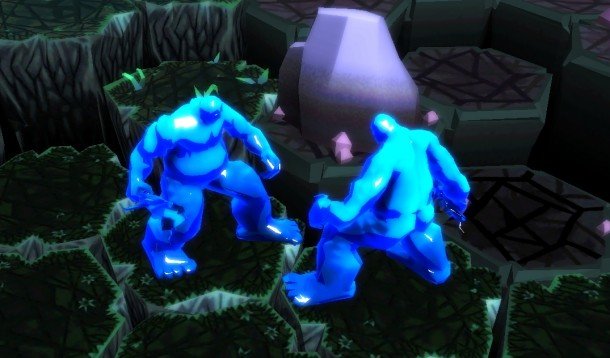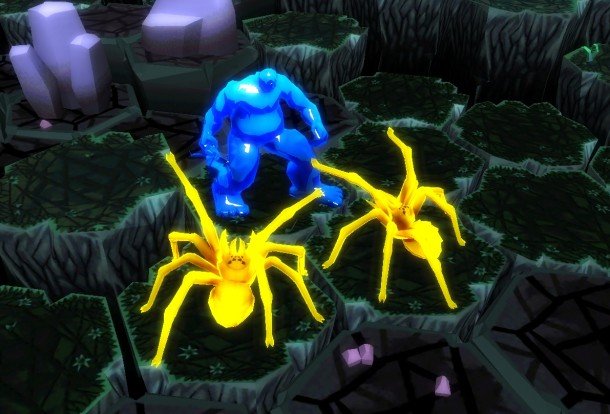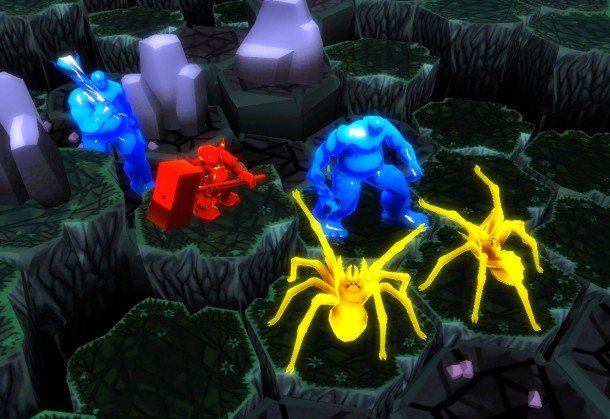Julian Gollop on Chaos Reborn, its card game origins and its new metagame

As Julian Gollop told us yesterday , now that his most famous creation - XCOM - has been remade, his obsession with replicating it has gone. Instead, he's flashing back even further to a game so old very few readers will remember it; one of the missing links of gaming, Chaos. Gollop's Chaos Reborn will be out some time in 2014. At GDC we talked with him about the game's origins, the changed mechanics and the new meta-game he's introducing.
"The screen fills with creatures and magic fire and gooey blobs and stuff."
Chaos, for those not born in the '70s, was a 1985 turn-based multiplayer ZX Spectrum game published by Games Workshop where each player controlled a wizard who was capable of summoning creatures and spells to attack his opponents - and defend himself. "You're just looking at a black screen as an arena with your wizard but it gets filled up with creatures and magic fire and gooey blobs and stuff," recalls Gollop. "It worked brilliantly as a multiplayer game so I want to update it with proper internet multiplayer connectivity."
Fascinatingly, the original version of Chaos was actually a card game, reflecting Gollop's love of tabletop games. "Basically you had grid of squares, which was your board or arena. You had a wizard character, you put it on your wizard card and you had a hand of cards which was your spells. So to cast a spell you put your card down, roll the dice to cast it. If it's a creature it goes on the board, you can start moving it around. If it's a spell, you have to resolve the effect of the spell. So yeah, it was originally a board game. On my blog I've got some pictures of the cards. I put them up a couple of months ago. So, I still have the original cards from this board game that I made. I often had lots of ideas for board games. I made one - a couple, actually - while I was at Ubisoft which we played with the level designers there."

Like the best older games, there's a bit of maths in it. "There's a lot of probability in the game, every spell has a certain probability to be cast, so the more powerful spells tend to be the most difficult ones to cast," says Gollop. "You roll to make a creature like a gold dragon and it was something like 20%, I think it was, for casting it."
"Like the best older games, there's a bit of maths in it."
What Gollop doesn't mention is that there's a huge variety of spells and that, in the original Chaos, they were randomized for each wizard each time you played. The spells also had different alignments, which altered the general alignment of the arena, making spells of that type easier to cast. "We will elaborate a bit on the spells, for sure, there'll be more spells."
Creatures can also be cast as illusions. "If you cast it as an illusion you would automatically get it. There was no possibility that you'd fail, which was cool because every player has a disbelief spell. If somebody summons a gold dragon, probably most players would think, 'Well no. Now, that's probably an illusion. I'll try and disbelieve it.' But if you disbelieve it and you fail, you've wasted your opportunity to cast a spell and you could be in trouble. So, this little simple mechanic creates little bluffing strategies between players. Because of the high element of randomness and probability in the game it kind of makes the gameplay less predictable and controllable for each player which in some ways is more fun because there's always a possibility to win the game, however small. The gold dragon could come out to your wizard and attack you, you might survive. Not very likely. You might then attack the gold dragon and you might kill it. Not very likely... but you could, for example. The odds are in there. Trying to analyse why it works is quite interesting but I know for sure it does work well as a game and I want to bring it back."

He's not just sticking with a vanilla remake though - he's adding a whole metagame on top, definitely for singleplayer, but maybe for multiplayer too. "It's going to be a little bit simpler than XCOM. The idea is that you're asked as a player to name the world that you wish to explore. This is used as a random number seed generator for the environment. So you have a world which is full of different regions, different types of terrain, and you're exploring."
Keep up to date with the most important stories and the best deals, as picked by the PC Gamer team.
Your objective is to kill the Chaos King of a region but your secondary objective is to find artefacts, which will be useful for your wizard in both single and multiplayer. Each region has is own king, terrain, enemies, and special areas. "There's special places within realms, places where you can learn your spells, places where you can teleport, places where you can move things around the world... it's procedurally generated in the sense that yeah, you're still within an environment (that) consists of distinct regions, but they're randomly put together... The thing about this generating from a name you type is that you can say to a mate of yours, 'Look, try this particular word because in this particular region you will find a tower of mist where you can get the Cloak of Fortitude.'"
"Gollop is determined to replicate the style, if not the look, of the original title."
As for the looks, Gollop is determined to replicate the style, if not the look, of the original title. "Although the concept art is obviously a lot more sophisticated than on a 48k Spectrum, we wanted to have some kind of feel or some kind of reminiscence of how the original game looked with it's completely monochromatic but brightly coloured, primary colour sprites and this black background. We're not going to have a black background but we're certainly going to have a dark background, for sure, and a bit more of an abstract, stylish graphics which is more illustrative than purely real rendering stuff."
Mechanically, Gollop has said on his blog that Chaos Reborn will probably be free-to-play - but that if that happens, he'll release an entirely free Classic Chaos game. The game is likely to arrive next year, but it's still very much up in the air, as Gollop is still building a development team.

